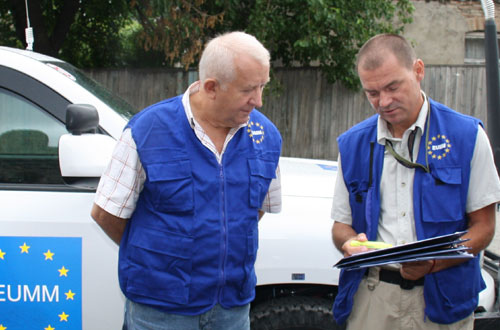EUMM Head: Security Situation Improved
Article by Ambassador Andrzej Tyszkiewicz, Head of the European Union Monitoring Mission in Georgia (EUMM)
- ‘It should not be acceptable that Georgia, Russia don’t have diplomatic relations’;
- Allegations of Georgian military build-up at administrative borders not confirmed;
- Transparency of Georgian military is ‘really productive’;
- Call for Russia to reciprocate in providing military transparency;
- Much of the EUMM’s focus made on freedom of movement;
- EUMM ‘constantly focuses on being as impartial and objective as possible’

Head of EU Monitoring Mission in Georgia Andrzej Tyszkiewicz (left) is briefed by an EUMM monitor during a patrol from EUMM Field Office Mtskheta on August 4, 2011. Photo: EUMM.
My impressions of the conflict situation in Georgia
I have now been Head of the EUMM since July. I would like to take this opportunity to give my first impressions of the conflict related situation here in Georgia. Already, I have had the chance to meet President Saakashvili, and some of his Ministers from the institutions that are most relevant to our Mission. I have also been able to meet with the parties to the conflict, specifically in the context of the Geneva discussions, and the Incident Prevention and Response Mechanism (IPRM) meetings, where security incidents and other issues affecting the local population are discussed.
Having now attended two IPRM meetings in Dvani and one in Gali, I must say that I am impressed with the hard work and the professional, business-like manner with which all the participants generally conduct themselves. I have also discovered that leading this Mission is a very active job, working closely with our three Field Offices in Mtskheta, Gori and Zugdidi. I have a lot of respect for the wide ranging work done by our monitors on the ground, which is vital for me to be able to work effectively and constructively with all the participants in the IPRMs, as well as with the Georgian authorities.
I would say that there is no doubt that the security situation has significantly improved since the immediate aftermath of 2008. At that time there was a real concern that there could be a return to hostilities but it is encouraging to note that things have since changed for the better.
The situation now is broadly calm along the Administrative Boundary Lines (ABL), although still sometimes unpredictable. In addition to continually monitoring the security situation, much of our current focus is also on freedom of movement for the local population and detentions. It is important for all concerned that people are able to go about their daily lives, visiting their farms, relatives or religious sites without fear or hindrance.
The role played by EUMM in contributing to improved stability on the ground
Our mandate of course derives from the Six Point Agreement signed on 12 August 2008, and the subsequent agreement to monitor its implementation. Our core business is to contribute to the prevention of further conflict and, by working with the parties, to try to find ways to alleviate the negative consequences of the situation facing all those conflict-affected communities particularly those who live near the ABLs.
We do this by monitoring the security situation on the ground and its impact on the local population on all sides of the ABLs. In the IPRM meetings, we also provide objective information on specific issues to the participants. This can help inform their discussions but also encourage greater transparency in their dealings with each other.
Actually, military transparency is something which we consider to be a particularly important contribution to stabilization. EUMM has two Memoranda of Understanding (MoU) with the Georgian Defence and Interior Ministries respectively that restrict the weapons and personnel allowed by the police and armed forces near the ABLs. We are constantly monitoring compliance with these agreements.
This unilateral move by the Georgian authorities has proven really productive. At the recent round of Geneva discussions, we gave an update on the latest security situation including Georgian compliance with these MoUs. In this respect, the results of our observations run counter to the general allegation that Georgia is increasing its military potential at the ABL, something that was also voiced at the Geneva discussions.
In fact, this leads me to another important part of our job; defusing potential flash points by carefully checking different sources of information before the situation gets out of control, or passing information to the IPRM participants which we do using a ‘hotline’ phone contact.
Short- mid-term developments in the future in terms of the situation in the region and the Mission itself
On the diplomatic level, I would like to see improved relations between Georgia and Russia. In the modern world, and in particular in this regional context, it should not be acceptable that these two countries don’t have diplomatic relations.
Talking specifically from the Mission’s perspective, I would reiterate the improved impact on stability that could come with greater military transparency, particularly if the Russian Federation could reciprocate in some way the Georgian MoU commitments I have already mentioned.
Also, it is important that EUMM can continue to provide a full and impartial picture of the situation on the ground.
This point is worth some extra clarification. The EU as a whole clearly supports Georgian territorial integrity, and this is the framework in which EUMM functions. However, I must emphasize that in our work on the ground, in terms of how we monitor and how we report, the Mission constantly focuses on being as operationally impartial and objective as possible.
We consider this to be essential in order to be credible. In this respect, it is highly desirable that we are able to continue developing our practical working relations with all parties to the conflict. Of course, access to South Ossetia and Abkhazia would clearly be a positive step towards achieving the full potential of the Mission, by ensuring international monitoring in the disputed territories.